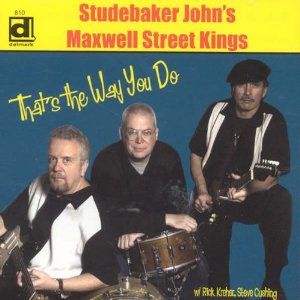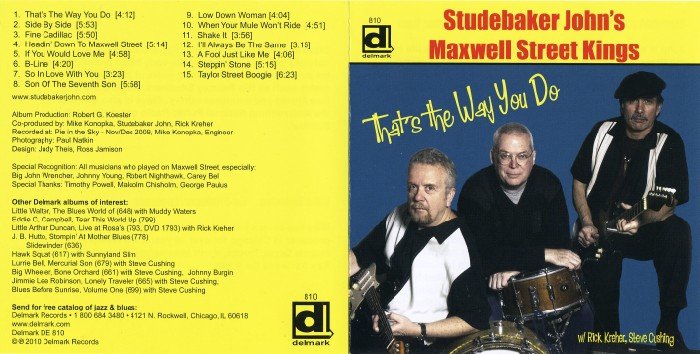
Beale Street and Bourbon Street are to early American music what the Mississippi flood plain was to early American agriculture: essential. The land between these two world famous downtown avenues was home to a blossoming sound, a sound that would become the first truly American genre of music, and would represent what early American life was like for those who barely, if at all, survived on the fringes of a frontier lifestyle—many without any say in the matter. Out of these hardships came the Blues, forced out of the mud and clay like so many scant harvests. And then, someone plugged it in.
“That’s the Way You Do”, is an album with a sound that must be the next best to thing to being present when the likes of Howlin’ Wolf, Sonny Boy Williamson, and Muddy Waters first went electric. Studebaker John’s Maxwell Street Kings, a trio, capture what makes this street in Chicago the equivalent to Beale and Bourbon. This is where the blues came after it caught a train out of the Deep South looking for work. Think back to that scene from The Blues Brothers, when John Lee Hooker sings “Boom Boom” amidst the bustle of what seems like a busy port, people pouring out of every corner, newly arrived, delivered from the blood, sweat, and tears of rural living in the South, to the bright lights of Chicago, and the hope of a new life. But it could never be as easy as that, and the Blues was there to express what simple words never could.
This album uses all of the classic tools to get its point across. From the first track the listener knows this won’t be a bells and whistles experience as the undeniable howl of the harmonica opens up to that pocket blues beat. Next comes “Side by Side”, which is a purist clinic on slide work. And, really, that’s what this whole album is: pure, dirty, urban blues, played by Maxwell Street purists, musicians who grew up listening to all of the greats you’ve never even heard of, and taking notes the whole time, down to the smell of stale beer and cigarette smoke on Sunday mornings, when the buzz of guitar amps stirred the early risers out of bed and back out for more of the same from the night before.
“Son of the Seventh Son” is homage to that original natural born lover’s man, Muddy Waters. And as Studebaker John sings, “Don’t you know this mannish boy has grown to be a man.” This is a slight maturation of what Muddy and Hooker brought up from Mississippi, but only slight. With this track the Maxwell Street Kings show why they’re worthy of such a lofty title. They show the balls, the brass, the hoodoo voodoo sound that couldn’t be kept down South, tucked away in Juke Joints. They show that the blues is much more than a method of arrangement or rhythm, more than seventh chords and that hard 4/4. It’s a feeling, a sound that is undeniable, and known the world over. Because when it’s real, when the musicians mean it, everyone knows just what to do. Tap your feet, nod your head, shake your ass and get religious. This is primal American music played by modern purists, a Blues revival that incorporates all the attitude and sweaty, smoky midnight haze that makes life so fun to live, even when it’s gripped by something as lowdown as the Blues.
“The world knows its sound, the whole God Damn world knows that old Maxwell Street sound.”


